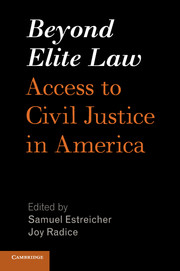Book contents
- Frontmatter
- Contents
- Beyond Elite Law
- Foreword
- List of Contributors
- Overview
- Overview
- PART I CURRENT STATE OF ACCESS TO LEGAL SERVICES
- PART II SOURCES OF LEGAL SERVICES ASSISTANCE FOR WORKING AMERICANS
- PART III FASHIONING A REFORM AGENDA
- 23 New York State Task Force to Expand Access to Civil Legal Services
- 24 New York's 50-hour Pro Bono Requirement
- 25 Starting a “Low Bono” Law Practice
- 26 Toward a More Effective and Accessible Solo and Small Firm Practice Model
- 27 Facilitating Homemade Wills
- 28 Court Facilitation of Self-Representation
- 29 Limited Representation and Ethical Challenges
- 30 Technology Can Solve Much of America's Access to Justice Problem, If We Let It
- 31 Mediation of Employment Disputes at the EEOC
- 32 AAA Consumer Arbitration
- 33 Saturns for Rickshaws: Lessons for Consumer Arbitration and Access to Justice
- 34 Employment Arbitration in the Securities Industry
- 35 FINRA Arbitration and Employment Disputes
- 36 Arbitration as an Employee-Friendly Forum
- 37 Access to Justice in Employment Arbitration: a Critical Look
- 38 Collaborative Technology Improves Access to Justice
- 39 Union Representation in Employment Arbitration
- 40 Legal Representation for New York City's Chinese Immigrant Workers
- 41 Reassessing Unauthorized Practice of Law Rules
- 42 The Pyett Protocol: Collectively-Bargained Grievance Arbitration as a Forum for Individual Statutory Employment Claims
- PART IV CREATING A CULTURE OF SERVICE
- Index
38 - Collaborative Technology Improves Access to Justice
from PART III - FASHIONING A REFORM AGENDA
Published online by Cambridge University Press: 05 May 2016
- Frontmatter
- Contents
- Beyond Elite Law
- Foreword
- List of Contributors
- Overview
- Overview
- PART I CURRENT STATE OF ACCESS TO LEGAL SERVICES
- PART II SOURCES OF LEGAL SERVICES ASSISTANCE FOR WORKING AMERICANS
- PART III FASHIONING A REFORM AGENDA
- 23 New York State Task Force to Expand Access to Civil Legal Services
- 24 New York's 50-hour Pro Bono Requirement
- 25 Starting a “Low Bono” Law Practice
- 26 Toward a More Effective and Accessible Solo and Small Firm Practice Model
- 27 Facilitating Homemade Wills
- 28 Court Facilitation of Self-Representation
- 29 Limited Representation and Ethical Challenges
- 30 Technology Can Solve Much of America's Access to Justice Problem, If We Let It
- 31 Mediation of Employment Disputes at the EEOC
- 32 AAA Consumer Arbitration
- 33 Saturns for Rickshaws: Lessons for Consumer Arbitration and Access to Justice
- 34 Employment Arbitration in the Securities Industry
- 35 FINRA Arbitration and Employment Disputes
- 36 Arbitration as an Employee-Friendly Forum
- 37 Access to Justice in Employment Arbitration: a Critical Look
- 38 Collaborative Technology Improves Access to Justice
- 39 Union Representation in Employment Arbitration
- 40 Legal Representation for New York City's Chinese Immigrant Workers
- 41 Reassessing Unauthorized Practice of Law Rules
- 42 The Pyett Protocol: Collectively-Bargained Grievance Arbitration as a Forum for Individual Statutory Employment Claims
- PART IV CREATING A CULTURE OF SERVICE
- Index
Summary
Online dispute resolution (ODR) systems have the potential to resolve cases before they end up in court, reducing costs for litigants and easing the burden of court caseloads. We have limited experience with ODR in the United States, but other countries have found ODR to be helpful even for people without attorneys. In this chapter, Michael Wolf describes international ODR systems and reviews studies that show benefits to unrepresented parties. An ODR mediator can use this technology to conduct intake, gather preliminary documents, and engage parties in a structured online negotiation, making ADR more accessible and affordable to low- and moderate-income Americans.
This chapter describes how international courts use online dispute resolution systems (ODR) to reduce costs and enable litigants to more effectively and efficiently resolve disputes. Courts in the United States can similarly use ODR to overcome hurdles that result from not being represented by a lawyer.
One way to lower barriers to access to justice is to resolve disputes outside the traditional court system. For almost three decades, American courts, from federal circuits to small claims, have been adopting ADR systems and empaneling dispute resolution practitioners to help manage court caseloads. Mediation and other types of court-annexed ADR systems generally are not best suited to parties who are looking for vindication, want to establish precedent, or want to maximize short-term recovery. Instead, the most satisfied users of ADR systems tend to be litigants who value quick results, privacy, simplicity, relationship retention, outcome compliance, and who want to minimize cost, risk, time, formality, and conflict.
Courts can play an important role in the ADR process by using collaborative technology that enables parties to choose methods of dispute resolution other than traditional litigation. This approach can help alleviate the overcrowded dockets of courts around the country, and ODR technologies can provide a less legalistic and more intuitive mechanism for resolving disputes.
Courts might find it cost-effective to also adopt an approved set of online workspaces through which empaneled dispute resolution practitioners can leverage ADR and ODR systems to improve access. Associations of dispute resolution practitioners, local bar associations, and even the Legal Services Corporation might share the tasks of testing and recommending preferred online workspaces and helping with licensing and training.
- Type
- Chapter
- Information
- Beyond Elite LawAccess to Civil Justice in America, pp. 544 - 549Publisher: Cambridge University PressPrint publication year: 2016
- 1
- Cited by



